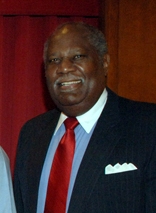
Editor's note: This post is part of the Celebrating Black History Month series, which highlights the contributions of African Americans throughout the Administration whose work contributes to the President's vision for winning the future.
Black History Month has special meaning to me. As a son of the segregated South, I was twenty-four before I was able to walk through the front door of the café where my mother worked as a short-order  cook and I was bused nearly 30 miles away each day for high school under the doctrine of ”separate but equal.” Growing up, I could never imagine the opportunities I had in my lifetime that came from the sacrifices and struggles of those who came before me.
cook and I was bused nearly 30 miles away each day for high school under the doctrine of ”separate but equal.” Growing up, I could never imagine the opportunities I had in my lifetime that came from the sacrifices and struggles of those who came before me.
I worked for the National Park Service for 39 years, the last four of which I had the great honor of serving as the Director. I was the first Director to undergo confirmation hearings before the United States Senate and the first African American to serve in this position.
At the National Parks Service, we preserve and protect over 390 national parks, three-fourths of which tell the story of our Nation’s history and development. Some of the stories told or events commemorated in the national parks reflect injustices and wrongs done in our Nation’s history. Nevertheless, they are places that should give us hope that we can move beyond our difficulties “towards a more perfect union.” Moreover, the national parks also help us remember those who have advanced the freedoms and liberties that we enjoy today -- who have come down the pathways of struggle -- people like Frederick Douglass, Martin Luther King, Jr., and Mary McLeod Bethune.
It is a sure sign that we as a people are growing and maturing that we can recognize some of our mistakes with the hope that we can learn and grow from them. May we continue to seek to remember all of our past and honor all our peoples.
Bob Stanton is a Senior Advisor to the Secretary of the Interior Ken Salazar

